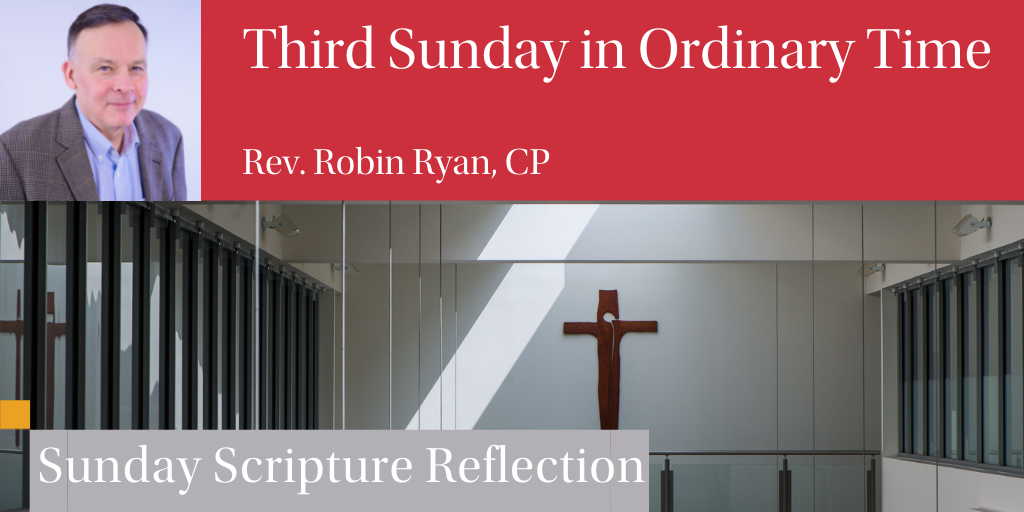

Readings:
Reading 1: Neh 8:2-4a, 5-6, 8-10
Responsorial Psalm: Ps 19:8, 9, 10, 15
Reading 2: 1 Corinthians 12:12-30
Gospel: Luke 1:1-4; 4:14-21
The Gospel readings for the Sunday liturgies this year will feature the Gospel of Luke. In the first part of this Sunday’s Gospel passage, Luke explains his purpose in writing. He wants to write an orderly account of the tradition about Jesus that has been handed down by the eyewitnesses. And he wants to do that so that his readers may realize the certainty of the teachings they have received.
Many of the Gospel stories and encounters with which Christians are most familiar are found only in the Gospel of Luke. Think of: the account of the annunciation to Mary by the angel Gabriel; the visitation of Mary to Elizabeth; the story of the Good Samaritan; the parable of the Prodigal Son; the words of the “Good Thief” who was crucified with Jesus, “Jesus, remember me, when you come into your kingdom.” If Luke had not written his Gospel, we would have none of those cherished memories. The Italian poet Dante called Luke “the scribe of Christ’s gentleness.” Luke illumined the compassion of Jesus with exquisite artistry.
That story of Jesus’s compassion really begins with the second part of this Sunday’s Gospel passage. Here Luke recounts the inauguration of Jesus’ public ministry. The scene is analogous to the inaugural address of the leader of a nation, describing the vision and setting the goals for the coming years. Jesus comes to his hometown synagogue, where he is in the presence of relatives, neighbors and friends. As a faithful, observant Jew he proclaims the reading from the Book of Isaiah. There is a vivid sense of curiosity and heightened expectation about this local man and what this moment might mean. And Jesus does not let them down. He makes the audacious statement that what the prophet proclaimed more than five centuries earlier is being fulfilled in their hearing. Something momentous is taking place in their very midst. Initially, the synagogue attendees marvel at all of this. But, as we will hear in next Sunday’s Gospel passage, the hometown crowd will quickly turn on Jesus and drive him out of town. Stay tuned.
Jesus lays his cards on the table. Through his identification with the prophetic passage, he affirms that his mission is to bring good news to the poor, freedom to those who are bound up, healing to those in need. The long-awaited Messiah is one who leads and rules by serving those most in need. Further along in Luke’s Gospel, the imprisoned John the Baptist will send his disciples to ask Jesus if he is the one who is to come or if they are to look for another. Jesus responds by pointing to the effects of his ministry: the blind see, the lame walk, the deaf hear, lepers are cleansed, the dead are raised, and the poor have the Good News proclaimed to them. These are the “credentials” of the Messiah who fulfills the vision announced in the Book of Isaiah.
I believe that this Gospel passage invites us to look to Jesus as the one who wants us to be free and whole people. He calls us to turn to him for the forgiveness that we often need. He urges us to face those things in our lives that may be imprisoning us, holding us bound. He invites us to recognize our own inner poverty and to allow him to fulfill our deepest desires. The risen Jesus is still present in our midst as one who serves.
The vision that guided the ministry of Jesus is also meant to inspire our mission as his disciples. In this Sunday’s second reading, Paul reminds the Christians at Corinth that they are the Body of Christ. The Spirit lives in them, and each member has an indispensable role in continuing the mission of Jesus in the world today. We are sent forth to extend his compassion to the poor, the captives, the ill of our day. We are called to make Jesus’ vision our own.
The risen Christ remains present to us as one who serves and offers life. He does that in a special way through the gift of the Eucharist. May we allow Christ to continue to give life to others through us. May his vision become our own.